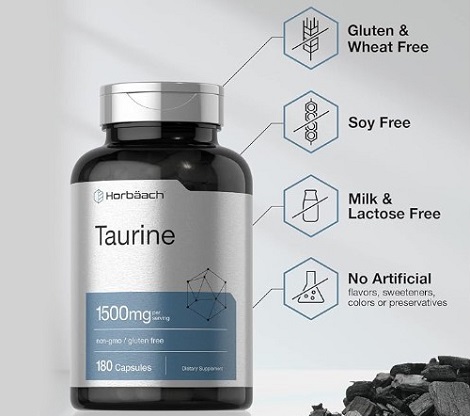Nikhil Prasad Fact checked by:Thailand Medical News Team May 22, 2024 1 year, 6 months, 4 weeks, 2 days, 22 hours, 41 minutes ago
Understanding Metabolic Syndrome
Metabolic syndrome (MetS) is a growing global health concern, affecting over a billion people worldwide. This condition is characterized by a cluster of risk factors that significantly elevate the likelihood of developing cardiovascular disease, type 2 diabetes, and stroke. These risk factors include abdominal obesity, high blood pressure, elevated fasting blood glucose levels, high triglyceride levels, and low levels of high-density lipoprotein cholesterol (HDL-C). The development of MetS is associated with insulin resistance, chronic inflammation, and neurohormonal activation.
 Taurine Supplements: The Potential Game-Changer for Metabolic Syndrome
Taurine: A Sulfur-Containing Amino Acid
Taurine Supplements: The Potential Game-Changer for Metabolic Syndrome
Taurine: A Sulfur-Containing Amino Acid
Taurine, a sulfur-containing amino acid, has garnered significant attention for its potential therapeutic benefits for MetS. Found abundantly in the heart, retina, liver, muscle, and platelets, taurine plays a critical role in various physiological processes such as osmoregulation, mitochondrial function, cell membrane stability, antioxidative defense mechanisms, and the regulation of cation balance. While it is primarily obtained through dietary sources like shellfish, dark meat, and some energy drinks, its potential in modulating metabolic parameters has made it a focus of scientific research. Taurine
Supplements are easily and cheapy available these days in many drug stores, pharmacies and online stores.
Study Overview: Taurine's Impact on Metabolic Syndrome
A recent study led by researchers from the National Taiwan University in Taipei involving a meta-analysis of randomized clinical trials (RCTs) to assess the impact of taurine supplementation on MetS-related variables showed positive results in terms of Taurine supplementations for preventing or treating metabolic syndrome issues. The researchers initially aimed to evaluate taurine's efficacy in reducing risk factors associated with MetS, providing insights into its potential as a complementary therapeutic agent.
Methodology
The researchers systematically analyzed data from various databases, including PubMed, Embase, Cochrane CENTRAL, ClinicalTrials.gov, and Web of Science, focusing on publications up to December 1, 2023. They assessed studies that met established MetS diagnostic criteria, which included systolic blood pressure (SBP), diastolic blood pressure (DBP), fasting blood glucose (FBG), triglycerides, and HDL levels. Secondary outcomes examined included body composition parameters, glycemic control, lipid profiles, and side effects.
Findings: Significant Reductions in MetS Risk Factors
The meta-analysis included data from 25 trials, encompassing 1,024 participants. The daily dosages of taurine in these studies ranged from 0.5 grams to 6.0 grams, with follow-up periods varying from 5 to 365 days. The findings revealed that taurine supplementation significantly reduced several key MetS risk factors:
-Systolic Blood Pressure (SBP): Weighted Mean Difference (WMD) of -4.0 mmHg&
lt;br />
-Diastolic Blood Pressure (DBP): WMD of -1.5 mmHg
-Fasting Blood Glucose (FBG): WMD of -5.9 mg/dL
-Triglycerides (TG): WMD of -18.3 mg/dL
These reductions were found to be dose-dependent, with higher doses of taurine correlating with greater decreases in DBP and FBG levels. However, no significant changes were observed in HDL levels. Importantly, the study found no notable adverse effects associated with taurine supplementation, indicating its safety as a potential treatment for MetS.
Mechanisms of Action: How Taurine Works
The beneficial effects of taurine on MetS risk factors can be attributed to several mechanisms:
-Blood Pressure Regulation: Taurine enhances nitric oxide availability and hydrogen sulfide production, promoting blood flow dilation and reducing blood pressure.
-Glycemic Control: Taurine lowers fasting blood glucose levels by decreasing hepatic glucose production, inhibiting glucagon activity, increasing uncoupling protein-1 levels, improving insulin clearance, and supporting beta-pancreatic cell health. It also upregulates adiponectin mRNA expression, enhancing insulin sensitivity.
-Lipid Metabolism: Taurine promotes bile acid synthesis and enhances LDL receptor activation, aiding in the reduction of total cholesterol and triglyceride levels.
The Potential of Taurine Supplementation
The findings of this meta-analysis highlight the significant potential of taurine supplementation in mitigating key risk factors associated with MetS. By reducing blood pressure, fasting blood glucose, and triglyceride levels, taurine offers a multifaceted approach to managing MetS. These results are particularly promising given the increasing prevalence of MetS and its associated health risks.
However, the study also underscores the need for further research to optimize taurine dosage and treatment duration. While the current evidence supports taurine's efficacy, variations in study protocols, participant characteristics, and trial durations necessitate more robust clinical trials to establish definitive guidelines for its use.
Limitations and Future Directions
The study's limitations include the heterogeneity of the included trials, variations in participant selection, and inconsistencies in study protocols. These factors contribute to variability in the results, which may affect the overall statistical significance of certain parameters like triglycerides and HDL-C levels. Additionally, most of the included studies had short durations, emphasizing the need for longer-term research to validate taurine's efficacy thoroughly.
Future clinical trials should focus on addressing these limitations by conducting longer-term studies with standardized protocols and larger sample sizes. Investigating the long-term effects of taurine supplementation, particularly in populations at high risk for MetS, will be crucial for developing comprehensive clinical guidelines.
Conclusion: Taurine's Role in MetS Management
In conclusion, taurine supplementation shows significant promise as a complementary therapeutic agent for managing MetS. Its ability to reduce key risk factors such as blood pressure, fasting blood glucose, and triglyceride levels positions it as a valuable addition to existing treatment strategies. By enhancing glycemic control and cardiovascular health, taurine offers a multifaceted approach to addressing the growing global challenge of MetS.
As an inexpensive and easily obtainable supplement, taurine's potential benefits extend beyond individual health to broader public health implications. Further research is essential to fill existing knowledge gaps and support clinical guidelines for its use. Integrating taurine supplementation with established pharmacological interventions could enhance treatment outcomes and improve overall cardiovascular health in MetS patients.
The study findings were published in the journal Nutrition & Diabetes.
https://www.nature.com/articles/s41387-024-00289-z
For more about the health benefits of Taurine
Supplements, keep on logging to Thailand Medical News.
Read Also:
https://www.thailandmedical.news/news/brazilian-randomized-clinical-trial-finds-that-taurine-supplements-can-aid-in-anti-aging-treatments
